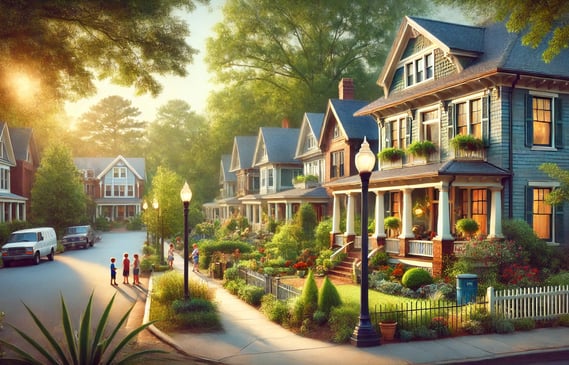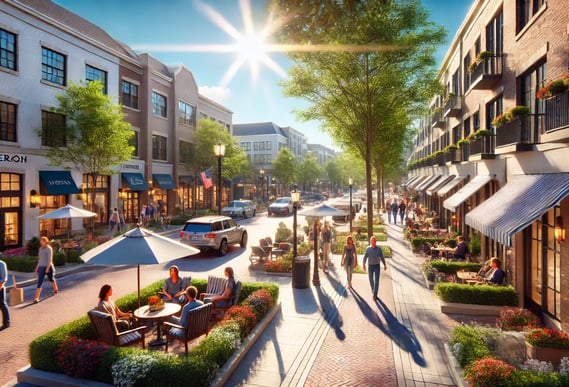The Growth of Suburban Neighborhoods in Raleigh
Explore the thriving suburban neighborhoods in Raleigh. Learn about key areas, growth factors, and future developments driving suburban expansion in this dynamic city.
RALEIGHWAKE COUNTYHOME MARKET TRENDS
George
8/13/20245 min read


The Growth of Suburban Neighborhoods in Raleigh
As Raleigh expands, its suburban neighborhoods are thriving, offering ideal living spaces for families and professionals. Explore the growth and development of Raleigh’s suburban areas and what makes them attractive.
Key Takeaways
Overview of Raleigh’s suburban growth
Highlighting key suburban neighborhoods
Factors driving suburban expansion
Future trends and developments
Suburban Expansion
Historical Growth Patterns
Raleigh’s suburban growth has been marked by a steady increase in population and development over the past few decades. Initially, suburban expansion began as the city’s urban core became more densely populated, prompting residents to seek more spacious living environments. The growth of Raleigh’s suburbs has been fueled by the construction of new housing developments, improved infrastructure, and a strong job market.
Current Expansion Trends
Today, Raleigh’s suburbs are experiencing a boom, characterized by the development of modern residential communities, commercial centers, and recreational facilities. The demand for suburban living has been driven by factors such as affordable housing, quality schools, and a desire for a more relaxed lifestyle away from the hustle and bustle of the city center.
Overview of Suburban Growth in Raleigh


North Hills
Development and Amenities
North Hills, also known as "Midtown Raleigh," has undergone significant development, transforming into a bustling suburban hub. The area features a mix of residential, commercial, and recreational spaces, including shopping centers, restaurants, and entertainment venues.
Real Estate Trends
North Hills is known for its upscale homes, including single-family houses, townhomes, and luxury apartments. The real estate market in North Hills is competitive, with property values steadily rising due to the area’s amenities and convenient location.
Five Points
Historic Charm and Community Feel
Five Points is a historic neighborhood that offers a unique blend of old-world charm and modern amenities. The area is characterized by its tree-lined streets, historic homes, and a strong sense of community.
Housing Market Insights
The housing market in Five Points features a mix of historic bungalows, cottages, and renovated homes. Property values in Five Points have appreciated over the years, making it a desirable neighborhood for those seeking a blend of history and modernity.
Key Suburban Neighborhoods in Raleigh


Brier Creek
Modern Development and Convenience
Brier Creek is a rapidly growing suburban neighborhood known for its modern infrastructure and convenient location near Raleigh-Durham International Airport. The area boasts a range of residential options, shopping centers, and recreational facilities.
Key Features and Real Estate Trends
Brier Creek offers a variety of housing options, including single-family homes, townhomes, and apartments. The neighborhood’s real estate market is dynamic, with steady demand and rising property values due to its amenities and accessibility.
Cameron Village (Village District)
Blend of Historic and Modern Elements
Cameron Village, now known as Village District, combines historic charm with contemporary living. The area features a mix of historic homes, modern apartments, and a vibrant commercial district.
Housing Options and Market Trends
The housing market in Cameron Village includes a variety of options, from historic single-family homes to new apartment complexes. The neighborhood’s real estate values have shown consistent growth, reflecting its desirability and central location.






Economic Opportunities
Job Availability and Economic Stability
Raleigh’s robust job market and economic stability are significant factors driving suburban growth. The presence of major employers in technology, healthcare, and education sectors attracts professionals seeking quality housing in suburban areas.
Influence of Nearby Employment Hubs
Suburban neighborhoods benefit from their proximity to employment hubs like Research Triangle Park (RTP) and downtown Raleigh. This accessibility makes them attractive to professionals who want to live close to work while enjoying the benefits of suburban living.
Factors Driving Suburban Growth in Raleigh
Quality of Life
Educational Institutions
Raleigh’s suburbs are home to some of the best schools in the region, both public and private. Excellent educational facilities attract families looking for top-notch education for their children.
Recreational Facilities and Green Spaces
Suburban neighborhoods in Raleigh offer abundant recreational facilities, including parks, greenways, and sports complexes. These amenities contribute to a high quality of life, providing residents with ample opportunities for outdoor activities and leisure.




Planned Developments
Upcoming Residential Projects
Several new residential projects are in the pipeline to accommodate the growing population in Raleigh’s suburbs. These projects include mixed-use developments, new housing communities, and expansions of existing neighborhoods, aimed at providing diverse housing options.
Infrastructure Improvements
Infrastructure improvements, such as road expansions, public transit enhancements, and the development of new schools and healthcare facilities, are planned to support suburban growth. These improvements will enhance connectivity and accessibility, making suburban living even more appealing.
Future Trends and Developments in Raleigh
Sustainability and Smart Growth
Green Building Practices
Raleigh’s suburban development is increasingly incorporating green building practices to promote sustainability. New construction projects are focusing on energy efficiency, sustainable materials, and environmentally friendly designs.
Smart City Initiatives
Smart city initiatives are being implemented to ensure sustainable growth and improve the quality of life in suburban areas. These initiatives include smart grid technology, advanced waste management systems, and the integration of smart transportation solutions.






Raleigh’s suburban neighborhoods are experiencing significant growth, driven by economic opportunities, quality of life, and planned developments. From the historic charm of Five Points to the modern conveniences of Brier Creek, Raleigh’s suburbs offer a variety of living options that cater to diverse preferences. With ongoing infrastructure improvements and sustainability initiatives, the future of suburban living in Raleigh looks promising.


